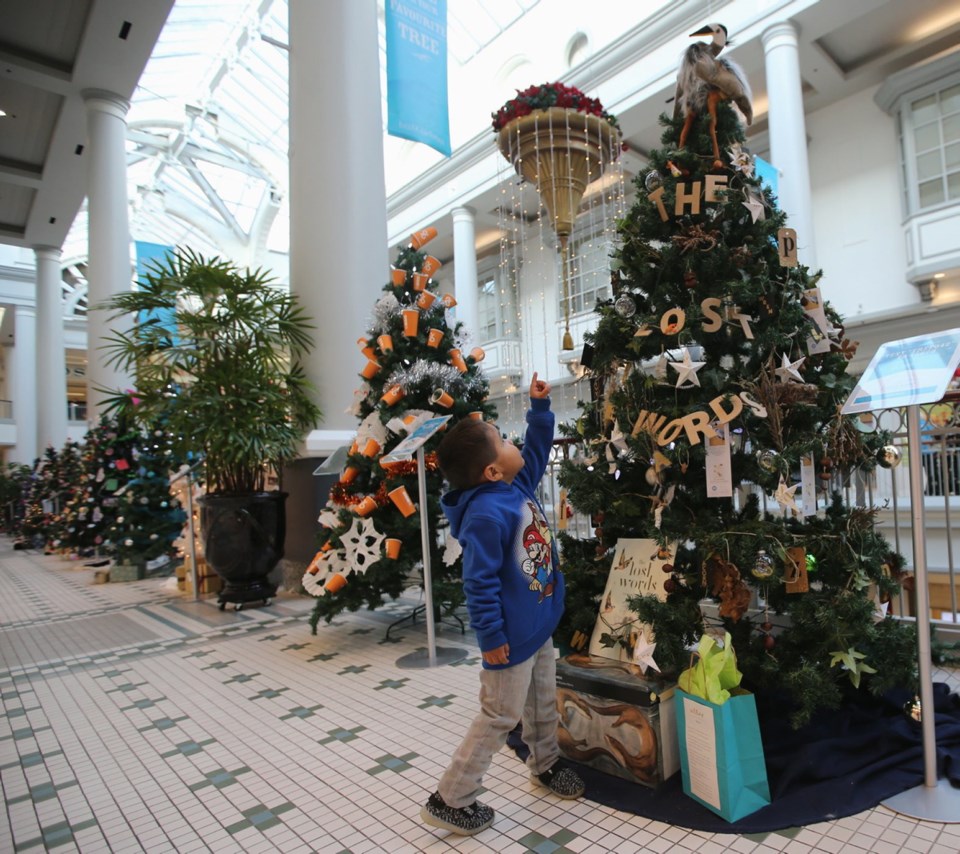 You don’t often see a real bird’s nest used as a Christmas tree decoration.
You don’t often see a real bird’s nest used as a Christmas tree decoration.
Or a real bird’s skull.
Ditto for conkers, acorns, brambles and heather, or ivy strung as garland. It’s as though they trimmed this tree by dragging it through a Berenstain Bears book.
The conifer in question is up on the third floor of the Bay Centre, part of the Festival of Trees, the annual B.C. Children’s Hospital fundraiser. Of the 81 other entries on display through Jan. 7, none is quite like the one decorated by the Swan Lake Christmas Hill Nature Sanctuary.
Its theme is The Lost Words, the title of a lavishly illustrated large-format “book of spells” that became a surprise bestseller in Europe last year after being written for the oddest of reasons: to preserve nature-related words that got booted from the Oxford Junior Dictionary.
This goes back to 2007, when the editors of that dictionary — a shortish, kid-friendly version — updated it by A) adding modern words commonly spoken by young people, and B) weeding out ones that analysis showed they seldom used. In came techie terms such as “blog” and “cut and paste” and “broadband.” Among the words going out were 40 from the natural world: buttercup, kingfisher, bluebell, wren, willow, otter …
When British nature writer Robert Macfarlane and painter Jackie Morris pushed back with The Lost Words, a book based on 20 of those 40 excised terms, it was seen as a protest against not just the fading place of nature among the language of youth, but the loss of the natural world itself. The book took off, was labelled an instant classic — a “cultural phenomenon,” declared the Guardian.
Among those captivated by The Lost Words (just released in Canada this fall) were the people at the Saanich nature reserve. Hence the Christmas tree decorations incorporating the 20 words from the book: the wren nest, a raven’s skull, a heron feather, chestnuts, ivy, heather, a couple of newts (OK, the newts are fake). The adornments were fashioned by executive director Kathleen Burton and Swan Lake volunteers, using materials found within the sanctuary itself. “You only have to step on the grounds to find the ferns,” Burton says.
In fact, 17 of the 20 items named in the book can be found there, Burton says. “They’re not gone. They’re relevant to nature and they’re relevant to teaching children about nature.”
So, yes, it rankled to learn the words had disappeared from the dictionary. “It’s like making something extinct before its time,” Burton said. The Christmas tree decorations can be taken as a subtle, gentle form of protest (as well as a way to nudge shoppers across Government Street to Munro’s Books, which is donating $8 from every sale of The Lost Words to the nature sanctuary).
The Canadian Press recently quoted Macfarlane as saying the fault isn’t really that of the dictionary’s publisher, which was just following a policy of including and excluding words based on the frequency of their use. “Blaming a dictionary for telling us how we use language is like blaming a barometer for telling us we’ve got bad weather on the way. It just records the pressure, and the pressures at the moment are that children are thinking less about nature.”
Dictionaries frequently update themselves to reflect shifting times. In October, the Oxford English Dictionary’s latest quarterly revision stretched to 1,400 changes, including the addition of alt right, microbead, uncheck, lumbersexual, douchebaggery and bum crack.
In September, Merriam-Webster revealed 840 new entries, several of them driven by technological change — biohacking, Instagramming, airplane mode, force quit. Also added were hangry (as in a Snickers commercial), bingeable (as in Netflix), time suck (also Netflix) and TL;DR (shorthand for “too long; didn’t read”).
On that last note, thanks for hanging in, dear reader. But before you go, pause a moment to reflect not only on what is being gained but what is being lost.
Can I have a word?
I’d like to know: What are the words that have exited your own lexicon? What are the terms you wish were still used?
Conversely, what are the ones you hope to never hear again? (Personal picks: endangered orcas, three-sailing wait and Stanley Cup champion Toronto Maple Leafs.)
Please send your submissions to jknox@timescolonist.com.



